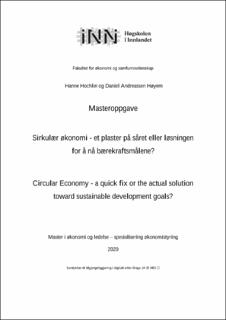| dc.contributor.author | Hochlin, Hanne | |
| dc.contributor.author | Andreassen Høyem, Daniel | |
| dc.date.accessioned | 2021-08-12T13:01:58Z | |
| dc.date.available | 2021-08-12T13:01:58Z | |
| dc.date.issued | 2020 | |
| dc.identifier.uri | https://hdl.handle.net/11250/2767624 | |
| dc.description | Spesialisering økonomistyring | en_US |
| dc.description.abstract | En hovedårsak til forverring av det globale miljøet er dagens mønster av produksjon og forbruk, ofte referert til som den lineære økonomien. Dette studie er sentrert rundt skifte fra lineær- til sirkulærøkonomi. Hvor hensikten er å belyse hvilke muligheter sirkulærøkonomi kan skape for aktørene i bransjen. Innledningen omhandler bakgrunnen for studie, samt avgrensning og problemstilling. Vårt teoretiske rammeverk vil ta for seg sirkulærøkonomi, produktdesign, forretningsmodeller, offentlige reguleringer og virkemidler for å endre atferd blant forbrukerne. Masteroppgaven er en kvalitativ studie. Vi har intervjuet personer som jobber i friluftsbransjen, sirkulære medlemsorganisasjoner og avfall- og gjenvinningsbransjen for å besvare vår problemstilling. Funnene våre viser at sirkulær økonomi har et potensiale for å bidra til at bærekraftmålene blir nådd. For å klare dette er det en rekke barrierer som må overvinnes. Det vil blant annet være behov for at aktørene i bransjen endrer sine produktdesign og således deres forretningsmodeller for å kunne tilby forbrukere nye, attraktive og smarte løsninger. I tillegg vil en omstilling til en sirkulær økonomi kreve investeringer i forskning og utvikling, komplekse samarbeid samt holdningsendringer hos både forbrukere og aktører i bransjen. Vi finner samtidig at det i begynnelsen vil være behov for offentlige reguleringer slik at alle aktører må fokusere på å lukke sirkelen. Vi konkluderer med at samspillet mellom individnivå gjennom forbrukeren (mikro), virksomhetsnivå (meso) og systemnivå ved offentlige reguleringer (makro) er det som muliggjør et skifte fra lineær- til sirkulærøkonomi. Friluftsbransjen er fortsatt dypt integrert i en lineær tankegang, selv om aktørene har begynt å ta mer initiativ til sirkulære forretningsmodeller. Vi finner at det må en endring først på et høyere systemnivå gjennom reguleringer og økonomiske virkemidler for å få til sirkulær økonomi. Sirkulær økonomi og sirkulære forretningsmodeller er en del av løsningen for å oppnå et grønnere skifte. Den konkluderer med viktigheten av å holde på bærekraft som et hovedmål, og at forretningsinitiativer for sirkulær økonomi må suppleres med virkemidler. Sirkulær økonomi ser ut til å være en viktig del av den bærekraftige løsningen, men ikke den fullstendige løsningen. | en_US |
| dc.description.abstract | Abstract
One of the main reasons for environmental issues is today's pattern of production and consumption - often referred to as the linear economy. This study is centered around the shift from linear to the circular economy, where the purpose is to elucidate the opportunities circular economy can create for the actors in the industry. The introduction starts with the background of the thesis, as well as the definition and the problem. Our theoretical framework will address circular economics, product design, business models and government regulations and instruments to change consumer behavior. The thesis is a qualitative study, and we have interviewed people who work in the outdoor industry, circular member organizations and waste and recycling industry to answer our research question. Our findings show that the circular economy has the potential to help achieve the sustainability goals. To overcome this, there are several barriers that must be solved. There will be needs for actors in the industry who are changing their product design and thus their business models to offer consumers new, attractive and smart solutions. In addition, a change to a more circular economy would require investments in research and development, complex collaboration as well as changes in attitudes of both consumers and actors in the industry. At the same time, we find that there will be a need for public regulation in the beginning, to force all actors to focus on closing the circle. This thesis concludes that the interaction between individual level through the consumer (micro), business level (meso) and system level in public regulations (macro), must be in place in order to change from the linear to a circular economy. The outdoor industry is still deeply integrated into a linear mindset, despite the beginning to take more initiative in circular business models. We find that there needs to be a change first at a higher system level through regulations and financial instruments to achieve a circular economy. Circular economy and circular business models are part of the solution to achieve a greener shift. It concludes with the importance of maintaining sustainability as a key objective, and that business initiatives for the circular economy must be complemented by incentives. | en_US |
| dc.language.iso | nob | en_US |
| dc.subject | sirkulærøkonomi | en_US |
| dc.subject | Circular Economy | en_US |
| dc.subject | kvalitativ metode | en_US |
| dc.subject | Qualitative Method | en_US |
| dc.title | Sirkulær økonomi - et plaster på såret eller løsningen for å nå bærekraftsmålene? | en_US |
| dc.title.alternative | Circular Economy - a quick fix or the actual solution toward sustainable development goals? | en_US |
| dc.type | Master thesis | en_US |
| dc.subject.nsi | VDP::Samfunnsvitenskap: 200::Økonomi: 210::Samfunnsøkonomi: 212 | en_US |
| dc.source.pagenumber | 112 | en_US |
